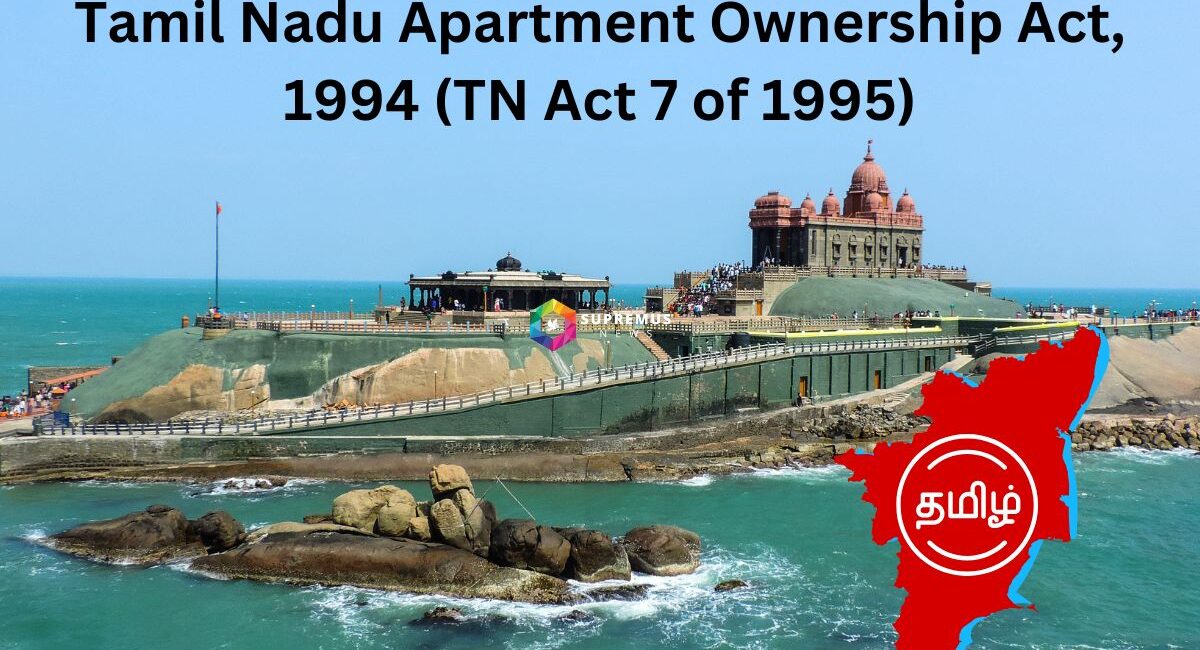Tamil Nadu Apartment Ownership Act – References from multiple websites.
Dear Residents,
Maintaining fairness in how housing associations levy monthly maintenance fees is crucial. In Tamil Nadu, two key laws govern apartment complexes and resident welfare associations: the Tamil Nadu Apartment Ownership Act, 1994 (Tamil Nadu Act 7 of 1995) and the Tamil Nadu Societies Registration Act, 1975. Below, we discuss what these laws say about calculating maintenance charges (per square foot vs per unit), and outline steps residents can take to challenge an unfair maintenance policy.
Legal Requirements for Maintenance Charge Calculation
Tamil Nadu Apartment Ownership Act, 1994 (TN Act 7 of 1995)
This Act (sometimes referred to as the Tamil Nadu Ownership Flats Act, 1994) provides a framework for apartment owners’ associations and their obligations. It explicitly requires that common expenses (maintenance costs) be shared in proportion to each apartment’s size/undivided share in the property, rather than equally per flat:
- Proportional to Undivided Share (Area): Section 19(1) of the Act mandates that “the common expenses shall be charged to the apartment owners according to the percentage of the undivided interest of the apartment owners in the common areas and facilities specified in the Deed of Apartment.” (Microsoft Word – 1995TN07 #) In simple terms, each owner pays maintenance in proportion to their apartment’s share of the building – effectively a per-square-foot (or per unit area) basis ( Maintenance charges by rwa fixed or variable in tamilnadu. which is valid? – Civil Law ). An owner of a larger flat (with a higher undivided share in common areas) must pay more, and a smaller flat pays less, reflecting their respective property sizes ( Maintenance charges by rwa fixed or variable in tamilnadu. which is valid? – Civil Law ).
- Cannot Be Changed by By-laws or Majority Vote: This method of apportioning expenses is a legal requirement. The Apartment Ownership Act has an overriding effect – any contrary agreement or practice is invalid. Section 25 of the Act states that its provisions prevail over any inconsistent laws or contracts ( Maintenance charges by rwa fixed or variable in tamilnadu. which is valid? – Civil Law ). This means an association’s by-laws or resolutions cannot lawfully impose equal flat-rate maintenance if it conflicts with the Act’s per-area mandate. For example, if a majority of owners vote to charge a flat fee per unit, that decision would be ultra vires (beyond the association’s legal power) because the statute requires a per-area share.
- Association By-laws Must Align: The Act also requires that the association’s by-laws include how common expenses are collected (and it should align with the proportional scheme) ( Maintenance charges by rwa fixed or variable in tamilnadu. which is valid? – Civil Law ). In practice, most apartment deeds and association by-laws in Tamil Nadu echo this law – specifying that maintenance is calculated on each flat’s Undivided Share of Land (UDS) or square footage.
Tamil Nadu Societies Registration Act, 1975
Many apartment associations in Tamil Nadu are registered as societies under the Societies Registration Act, 1975. This Act is a general law for registering societies (including resident welfare associations) and does not itself dictate how maintenance charges must be calculated. Instead, it allows societies to create their own by-laws and rules for managing affairs. Key points regarding this Act in the housing context:
- Registration of Associations: Apartment owners often form a society under this Act for their association’s legal status. The Apartment Ownership Act explicitly permits this – an apartment owners’ association may register under the Societies Act or as a co-operative society, and it will still be recognized under the Apartment Ownership Act (Microsoft Word – 1995TN07 #). (In fact, Section 3 of the 1994 Act ties into this by allowing a minimum of five owners to form an association under either law.)
- By-laws vs. Statute: The Societies Act leaves maintenance fee structures to the association’s by-laws and member resolutions. An association could, in theory, write a by-law charging equal fees per unit. However, if the apartment complex is subject to the Apartment Ownership Act (which is usually the case for registered apartment associations), the statute’s requirement of proportionate sharing will override any conflicting by-law ( Maintenance charges by rwa fixed or variable in tamilnadu. which is valid? – Civil Law ). In other words, the society must comply with Section 19 of the Apartment Act despite being registered under the Societies Act. The Societies Act itself doesn’t require per-square-foot charges, but the moment you are dealing with an “apartment owners association,” the Apartment Ownership Act’s provisions become applicable and take precedence ( Maintenance charges by rwa fixed or variable in tamilnadu. which is valid? – Civil Law ).
- No Explicit Maintenance Formula in Societies Act: Apart from general financial accountability, the Tamil Nadu Societies Registration Act, 1975 doesn’t contain provisions on how to split maintenance. Its focus is on proper accounting, annual general meetings, and lawful functioning of the society. So, legally the benchmark comes from the Apartment Ownership Act for issues like maintenance distribution. The net effect: Charging maintenance by square footage (UDS proportion) is the legally supported method in Tamil Nadu, and charging a flat equal amount per unit is likely to be deemed contrary to the Apartment Ownership Act’s intent (Microsoft Word – 1995TN07 #) ( Maintenance charges by rwa fixed or variable in tamilnadu. which is valid? – Civil Law ).
Challenging an Unfair Maintenance Charge Policy
If a housing association is charging maintenance in a way that you believe is unfair or illegal (for example, a flat equal fee per unit regardless of size, contrary to the law), there are several steps and remedies residents can pursue. These range from raising objections within the association to seeking legal and government intervention. Below are the avenues to challenge such a policy:
1. Internal Resolution through the Association
Begin by addressing the issue within your association’s own framework:
- Review By-laws and Agreements: Obtain and review the association’s by-laws or any agreement you signed as an owner. See what method of maintenance calculation is specified. If the by-laws say it should be proportional to area (as many do), point out that the current practice violates the by-laws and the law. If the by-laws are silent or permit equal sharing, note that the Apartment Ownership Act’s requirement still applies by law ( Maintenance charges by rwa fixed or variable in tamilnadu. which is valid? – Civil Law ).
- Write a Formal Objection: Draft a letter to the managing committee of the association (President/Secretary), explaining why the current maintenance charge policy is improper. Cite Section 19(1) of the Tamil Nadu Apartment Ownership Act, 1994, which requires per-square-foot (UDS-based) charging (Microsoft Word – 1995TN07 #). Mention that this is a legal obligation, not just a preference, and include any supporting clauses from your by-laws or house rules that support your stance.
- Request Discussion in a General Meeting: Ask that your complaint be taken up at the next Annual General Meeting (AGM) or request an Extraordinary General Meeting. Under the Societies Registration Act, members have the right to call a special meeting if a requisite number (often specified in by-laws or rules) support it. For instance, if a certain percentage of members submit a written requisition for a meeting to discuss maintenance charges, the managing committee is bound to call one within a set time frame (). Use these provisions to bring the issue to a vote or at least on record in meeting minutes.
- Mobilize Fellow Residents: If you’re not alone in seeing the policy as unfair (e.g., owners of smaller flats who are overpaying), gather support. A collective representation carries more weight. Sometimes just the prospect of a united group raising a legal issue will persuade the association to reconsider its policy voluntarily.
- Document Everything: Keep records of your communications (letters, emails) and the association’s responses (or lack thereof). These will be important if you need to escalate the matter outside the association.
2. Complaint to the Registrar of Societies (Competent Authority)
If internal efforts don’t yield results, or if the managing committee refuses to correct the policy, you can take your grievance to the government authority that oversees societies:
- Who to Approach: In Tamil Nadu, the Registrar of Societies (under the Department of Registration) is the regulatory authority for societies registered under the 1975 Act. The Apartment Ownership Act designates this official as the “Competent Authority” for apartment associations registered as societies (Microsoft Word – 1995TN07 #). In practice, this is usually the District Registrar (of Societies) for your district or region. For example, in Chennai, the District Registrar (Administration) handles society registrations and complaints.
- Grounds of Complaint: Clearly state that the association’s maintenance charge policy is violating the Tamil Nadu Apartment Ownership Act, 1994. Quote the law’s requirement that common expenses be shared according to undivided share (area) ( Maintenance charges by rwa fixed or variable in tamilnadu. which is valid? – Civil Law ) and explain how the current per-flat charge deviates from this, causing inequity. If the association’s by-laws or AGM resolutions are inconsistent with the Act, point that out as well (since the Act overrides conflicting rules ( Maintenance charges by rwa fixed or variable in tamilnadu. which is valid? – Civil Law )).
- What the Registrar Can Do: The Registrar has supervisory and inquiry powers. Under Section 36 of the Societies Registration Act, if at least one-third of the members of the society (association) submit a complaint or request, the Registrar “may hold an inquiry into the constitution, working and financial condition of that registered society.” () Even without one-third of members, a well-substantiated complaint might prompt the Registrar to at least call for an explanation from the society’s officers (Registrar’s power under Section 34) or to inspect the books () (). The Registrar can direct the society to follow the law, and in extreme cases, can even cancel the society’s registration or take other action if the society is flouting legal requirements or its own by-laws.
- How to File the Complaint: Write a detailed letter to the Registrar of Societies for your area. Include: the association’s name and registration number, the facts of the dispute, copies of any relevant documents (by-laws, fee notices, correspondence), and the relief you seek (e.g., an order directing the association to levy maintenance fees per sq.ft. as per law, and to refund/adjust any overcharged amounts). You can send copies of this complaint to higher authorities like the Inspector General of Registration (who oversees all district registrars) if needed. The complaint can often be submitted in person at the Registrar’s office and followed up with them. In your complaint, reference that the law empowers the Registrar to investigate such issues, which adds weight to your request ().
- Follow Up: The Registrar may issue a show-cause notice to the association or call the office-bearers for a hearing. Be prepared to present your case. If multiple residents complained together, ensure all of you attend any hearing to demonstrate collective concern. The Registrar’s intervention often pushes societies to correct course to avoid further legal trouble.
3. Legal Remedies (Court Action or Consumer Forum)
If administrative remedies fail or are too slow, residents have the option to seek legal recourse against the association’s unfair policy:
- Civil Suit: One remedy is to file a civil suit in an appropriate court (typically the civil court or city civil court having jurisdiction) for an injunction and declaration. You would ask the court to declare that the association’s equal-per-unit maintenance charge is illegal and contrary to the Apartment Ownership Act, and to injunct (restrain) the association from continuing this practice. Backed by Section 19(1) of the Act (Microsoft Word – 1995TN07 #) and the association’s obligations under law, a court can order the association to comply with the per-square-foot charging method. You could also claim any excess money you paid (if you have been paying more than your fair share) as damages or seek an adjustment. This approach typically requires a lawyer and can take time, but a court order is binding on the association.
- Consumer Forum: Alternatively, you may approach the Consumer Disputes Redressal Commission (District Consumer Forum) if the matter can be framed as a deficiency in service or unfair practice. As a member of the association, you pay maintenance fees in return for services (upkeep of common areas, facilities, etc.). If the association is charging in a way that is not in accordance with law or the terms of your purchase/occupancy, you could argue this amounts to an unfair or arbitrary service condition. Consumer fora in India have, in some cases, heard complaints against housing societies/RWAs on issues of maintenance and amenities. The advantage of a consumer case is that it’s relatively faster and cost-effective, and you don’t need the one-third of members as in the Registrar route – even an individual aggrieved member can file a case. However, the forum will examine if a member vs. association dispute falls under consumer law; if not, they may direct you to a civil court. It’s worth considering with legal advice.
- Legal Notice and Mediation: Before filing a lawsuit or consumer case, often a legal notice from a lawyer to the association is sent. This formal notice will cite the laws (Apartment Act provisions, etc.) and demand a change in policy within a specified time, or else face legal action. Sometimes, this prompts negotiations or a settlement. The society may agree to switch to a fairer policy to avoid litigation. You could also explore mediation – either informal (with community elders or other neutral residents mediating) or formal mediation/arbitration if your association by-laws provide for dispute arbitration.
- Writ Petition (Rare): In extraordinary situations, one might file a writ petition in the High Court, especially if the issue involves enforcement of statutory duties by the Registrar or another public authority. For instance, if the Registrar of Societies fails to act on a valid complaint, a writ of mandamus could be sought to compel action. Generally, though, maintenance disputes are resolved through the mechanisms above rather than writ jurisdiction.
4. Other Authorities and Avenues
A few additional points and authorities to keep in mind:
- Housing Cooperative Department: If your association was instead registered as a cooperative housing society (under the Tamil Nadu Cooperative Societies Act), then the complaint would go to the Registrar of Cooperative Societies (Housing). The Apartment Ownership Act also recognizes co-op societies, and similar proportional maintenance rules apply. In such a case, the Cooperative Registrar (not the Societies Registrar) would be the one to approach. (For societies under the 1975 Act, stick to the Registrar of Societies as discussed above.)
- Local Government or Housing Board: While uncommon for fee disputes, some residents also approach local government officials (like the local Municipal Commissioner or the District Collector) especially if an association’s mismanagement has broader community impact. The District Collector in Tamil Nadu can forward matters to the Registrar or relevant authority. Similarly, if the apartment complex was originally developed by a government agency (e.g. Tamil Nadu Housing Board) and something in the sale agreement is being violated, that agency could be approached. However, for a purely private association matter like maintenance fees, these authorities may only act in a facilitative manner (if at all).
- Media and RWAs Federation: As a softer approach, bringing public attention can sometimes encourage a resolution. If many residents are aggrieved, voicing the issue in resident welfare forums or approaching media/press (without turning it into an excessive confrontation) could put pressure on the association. Tamil Nadu has various apartment owners’ federations or forums where guidance can be sought. Just ensure any public approach doesn’t violate association rules on publicity and is used as a last resort or alongside legal steps.
- Adherence to Process: While challenging the policy, continue paying the maintenance (perhaps under protest) as per the existing demand to avoid being labelled a defaulter – unless advised by a lawyer. You can inform the association that you are paying under protest and subject to outcome of the dispute. This shows your bona fides (good faith) and avoids giving the association a reason to penalize you (like denying voting rights for non-payment, which some by-laws allow if dues are unpaid).
Conclusion
In summary, Tamil Nadu law favors a per-square-foot (area-wise) maintenance charge system for apartment associations, as mandated by the Tamil Nadu Apartment Ownership Act, 1994 (Microsoft Word – 1995TN07 #). Associations are generally not legally permitted to impose a flat equal fee per unit if it results in owners with larger properties underpaying and those with smaller properties overpaying, since that would violate the proportional sharing principle of the Act ( Maintenance charges by rwa fixed or variable in tamilnadu. which is valid? – Civil Law ). Residents who encounter an unfair maintenance policy have multiple remedies – from raising formal objections in society meetings to complaining to the Registrar of Societies, and even seeking judicial intervention if necessary. By following the proper steps and citing the correct provisions, owners can compel their association to adopt a fair and legal maintenance charge policy. Remember, any change ideally starts with dialogue, but the law is on your side to ensure maintenance charges are levied in a just and legal manner for all residents.
Sources:
- Tamil Nadu Apartment Ownership Act, 1994 – Section 19(1) (Common expenses sharing by undivided interest) (Microsoft Word – 1995TN07 #) ( Maintenance charges by rwa fixed or variable in tamilnadu. which is valid? – Civil Law ); Section 3(i) (definition of “common expenses”) and Section 25 (Act’s override over inconsistent provisions) ( Maintenance charges by rwa fixed or variable in tamilnadu. which is valid? – Civil Law ).
- Tamil Nadu Societies Registration Act, 1975 – General provisions on society governance; Registrar’s inquiry powers (Section 36) ().
- Legal forums and expert commentary on maintenance charge disputes in Tamil Nadu, confirming that all expenses are to be shared proportional to the area of the flat under the state law ( Maintenance charges by rwa fixed or variable in tamilnadu. which is valid? – Civil Law ) and discussing remedies for aggrieved members.





